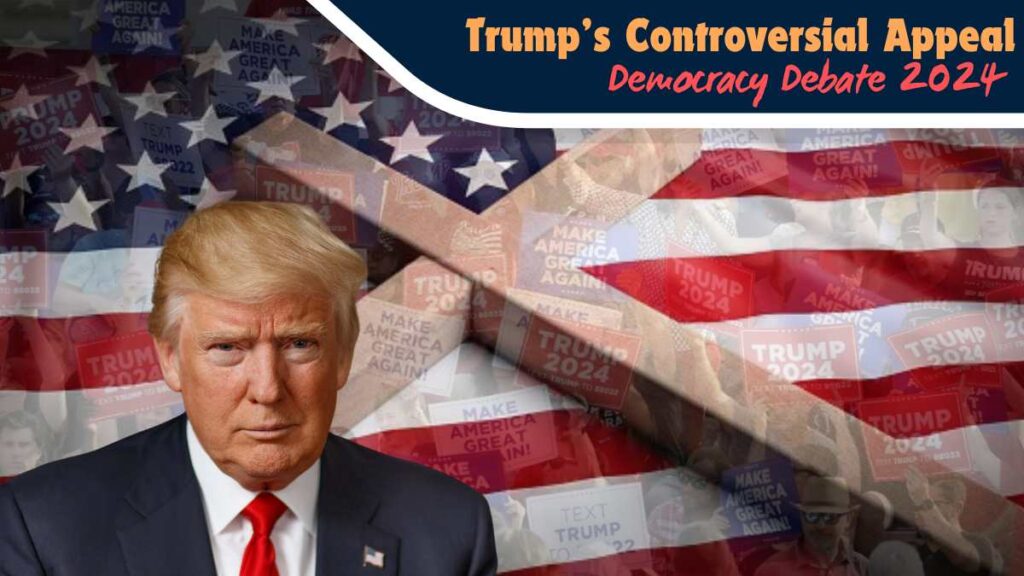As the 2024 presidential election in the United States approaches, former President Donald Trump has stirred up significant controversy with a recent statement directed at the Christian community. Trump’s controversial appeal to Christians, suggesting that if they vote for him, they may not need to vote again, has raised eyebrows and sparked debate about the implications for American democracy.
In a speech, Trump stated, “Christians should vote for me once, you won’t need to vote again in four years.” He further elaborated, claiming that his administration would fix everything so thoroughly that future voting would become unnecessary. This statement, while intended to convey his confidence in addressing the nation’s issues, has been interpreted by many as a signal toward centralizing power.
The American Context: Democracy and Religious Appeals
In the United States, appeals to specific religious communities for votes are not uncommon, given the significant role religion plays in American society. The Christian population in the U.S. is approximately 64%, although it is projected to fall below 50% by 2070 according to surveys. Despite this, direct appeals to religious groups in such a manner are controversial and raise questions about the separation of church and state.
Trump’s controversial appeal to Christians has drawn parallels to situations in other countries, where such statements might lead to significant international criticism, especially from the United States. Historically, the U.S. has positioned itself as a model of democracy, often advising other nations on election conduct and democratic practices. The question arises: how would the U.S. react if similar statements were made by leaders in countries like South Africa, Brazil, or India?
Project 2025 and Its Implications
Adding to the controversy is Project 2025, a 900-page document purportedly crafted by Trump supporters outlining significant changes Trump aims to implement if re-elected. Key among these changes is the proposal to fire a large number of federal employees and replace them with loyalists. This plan, according to critics like Vice President Kamala Harris, suggests a move towards autocracy and threatens the foundations of American democracy.
Harris has openly stated that Trump’s intentions with Project 2025 could lead to the U.S. becoming a dictatorship. She asserts that Trump’s plans involve sweeping changes to the federal government that could undermine democratic institutions. Current President Joe Biden has echoed these sentiments, emphasizing the threat to democracy and calling for vigilance.
Reactions and Concerns
The reactions to Trump’s controversial appeal to Christians and his potential plans under Project 2025 have been mixed. Supporters view his statements as a promise to restore order and efficiency to the government. They believe that Trump’s track record and his bold plans are exactly what the country needs to address its current challenges.
Opponents, however, are deeply concerned. They argue that such rhetoric undermines democratic principles and could lead to an erosion of civil liberties. The idea that future elections might become unnecessary if Trump is re-elected is particularly alarming to those who value democratic processes.
Comparing International Reactions
If a leader in another country appealed similarly to a specific religious group and suggested that future voting might be unnecessary, the international community, including the U.S., would likely condemn it. The U.S. has a history of promoting democratic values globally and criticizing leaders who appear to undermine these principles. The current situation raises questions about consistency and the standards by which democratic practices are judged.
Trump’s Plan to Combat Anti-Christian Bias
Trump’s speech also included a pledge to create a federal task force to combat anti-Christian bias in the U.S. He claimed that Christians are facing significant discrimination and that this task force would address these issues. This promise is likely aimed at bolstering his support among Christian voters, but it also raises concerns about the potential for favoritism and the implications for religious freedom and equality.
Looking Ahead: The 2024 Election
As the 2024 election draws nearer, the stakes are high. The future of American democracy appears to be at a crossroads, with significant debates about the direction the country should take. In the coming months, Trump’s controversial appeal to Christians and his broader plans for the country will be central issues.
What do you think about Trump’s controversial appeal to Christians? Do you believe his statements threaten democracy, or are they simply a reflection of his confidence in his policies? How should the U.S. balance appeals to religious groups with the principles of democratic governance?
Feel free to share your thoughts and engage in the discussion. Your perspective is valuable in understanding the broader implications of these statements and plans.

